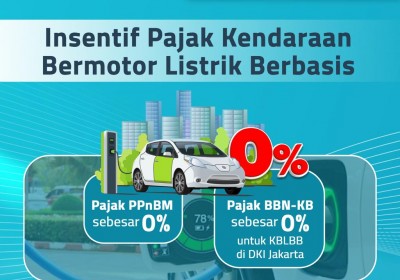Indonesia Focusing on Building Electrical Vehicle Ecosystem
November 09, 2021
JAKARTA – The Indonesian government has voiced its readiness to enter the electric vehicle age.
This notion was strengthened by the passing of Presidential Decree no. 55/2019 on Battery-Powered Electric Vehicles Program Acceleration for Road Use.
The National Industrial Development Working Plan, which outlines the growth of the automotive industry between 2020 to 2035, states that the priority areas that will be focused on for electrical vehicle development will be component development such as batteries, electric motorbikes, and inverters. The government's outlined roadmap is based on Industry Ministry (Kemenperin) Decree no. 27/2020 on Technical Specifications, EV Roadmaps and Fulfilling Local Component Composition (TKDN) Requirements.
"This regulation serves as a guide or explanation for automotive industry stakeholders regarding strategies, policies and programs that can help make Indonesia achieve its goal as becoming a production and export hub for electric vehicles," Industry Minister (Menperin) Agus Gumiwang Kartasasmita said in a written statement on Friday (15/10).
According to Minister Agus, key stakeholders of the automotive industry need to be involved in creating a proper ecosystem for electric vehicle development, especially regarding the needs of battery producers and consumers. "Also, this program also requires pilot projects that test the readiness of EV infrastructure such as charging stations," he added.
The government aims to produce 600,000 four-wheel electric vehicles and 2.45 million two-wheel vehicles by 2030. The minister noted that the production of electric vehicles is expected to help Indonesia reduce its CO2 emissions by around 2.7 million tons for four-wheel vehicles and 1.1 million tons for two-wheeled vehicles.
In its efforts to support the industrialization of EV production, the government is providing various fiscal and non-fiscal incentives for EV consumers, such as a 0% luxury tax (PPnBM) and a 0% vehicle ownership tax (BBN-KB) for battery based electric vehicle (KBLBB) owners in Jakarta, as outlined by the Jakarta Government (Pemprov DKI)'s Decree no.3/2020.
For the 10% BBN-KB for electric vehicles and 2.5% for electric motorbikes rule in West Java, a down payment of 0% and low interest rate for electric vehicles will be implemented, along with a discount for electric power connections and more.
Meanwhile, the EV industry will be able to take advantage of various facilities such as Tax Holidays or Mini Tax Holidays (as outlined on UU 25/2007, PMK 130/2020, Per BKPM 7/2020), Tax Allowances (PP 18/2015, Jo PP 9/2016, Permenperin 1/2018), Import Fee Waivers (PMK 188/2015), and Super Tax Deductions for research & development practices (PP 45/2019, PMK 153/2020).
Along with these regulations, the government will also try to help popularize the use of EVs in Indonesia by outlining a public EV purchasing roadmap to make the population more aware of it.
"In the roadmap that we designed until 2030, we believe that four-wheeled EV purchases will reach 132,983 units and two-wheeled EV purchases will reach 398,530 units," the Minister said.
He also iterated that the EV industry would require the consistent supply of EV batteries and its raw production materials as they are crucial in driving the EV strategy in Indonesia and in the entire global battery industry altogether. This is significant due to the fact that Indonesia has one of the largest nickel deposits in the world and also holds resources that could serve as alternatives, such as cobalt, aluminum and manganese.
"Currently, there are nine companies that are supporting the battery industry, with five of them providing raw production materials such as raw nickel, raw cobalt, ferro nickel and others, and the remaining four being battery producers, making Indonesia capable of producing electric vehicles from start to finish, even capable of recycling," Minister Agus said.
"The future of EVs also hang on battery innovation that currently tends to not use raw nickel, and cobalt while manganese such as lithium sulfur and lithium ferro phosphorus can make batteries cost less. Doing so is an innovation in itself and could become the basis of hydrogen storage".
These facts are the reason why Indonesia's battery industry must prepare and anticipate crucial technological developments going forward because it may result in the production of more advanced yet cheaper batteries that are able to produce more energy on a shorter charging period.
"With such disruptive battery technology available today, it indicates that the abundant supply of nickel, manganese and cobalt does not guarantee the production of efficient batteries. Potential costs and storage capacities of the new material must also be anticipated," Minister Agus said yet again.
According to Kemenperin data, EV sales have steadily risen every year, despite the Covid-19 pandemic, with projected passenger EV sales in 2021 potentially reaching 28 million units with a market share of 30%.
That growth, however, depends on the rising demand for 1.65 million GWh lithium ion batteries in 2030 as well as the need for up to 9.89 million charging stations as infrastructure.
"The high projection for EV usage and ownership in the world is influenced slightly by the global initiative campaign that is being championed by several developed nations who work together with global EV producers and other related actors," Minister Agus said.
***
Indonesia’s Research Institutions Supporting the Development of the Electric Vehicle Industry
Indonesian Muslim Fashion and Cosmetics IKMs Shine at Dubai World Expo 2020
Govt Steps Up UMKM Transformation Efforts in the Midst of Pandemic Slowdown
Govt Encourages Promotion of IKM Products in Digital Era
Government Begins Developing Maritime Training Center in Makassar
Tweets by IDDevForum
